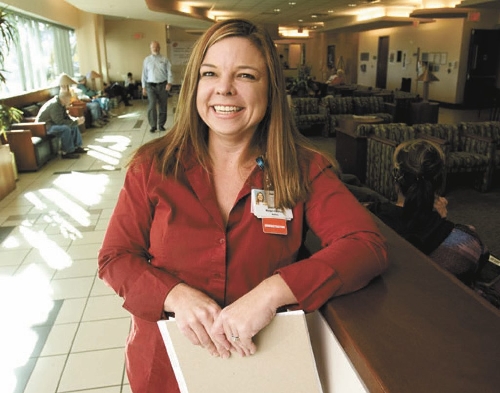Nurse at Summerlin Hospital shares diabetes lesson


Two years ago, Sheri Pentz was a 38-year-old diabetes educator at Summerlin Hospital who took to wearing a glucose monitor just to get a sense of how her patients dealt with being diabetics.
Then something strange happened to the young widow who never had to struggle with the disease.
The monitor showed the registered nurse had diabetes.
“I couldn’t believe that happened,” she said last week as she sat in her hospital office. “I was in denial for quite a while.”
It was endocrinologist Asheesh Dewan who broke the news to the staffer he often worked with.
“She was like most people diagnosed with Type 2 diabetes,” Dewan said. “She was in shock at first. But now she’s an even greater asset to Las Vegas than she was before. She’s a great role model for treating both pediatric and adult diabetics because she is maximizing the time before she needs insulin therapy. She’s exercising, watching her diet. If every patient would react to the news like she did, it would seriously reduce the complications of the disease.”
A diabetes support group helped her realize there was no reason to fall into depression or bemoan her fate.
“I saw it as a way to get off fast food and soda and to lose weight,” she said.
The 5-footer’s weight has dropped from 180 to 150 pounds as she drinks water to wash down small portions of fruits and vegetables and chicken and fish. She now runs three to four miles a day three or four times a week.
“It hasn’t been easy to change my life,” Pentz said.
Nearly 24 million people in the United States, about 8 percent of the population, have diabetes, which is the seventh-leading cause of death in the country.
Each year about 13,000 youngsters develop Type 1 juvenile diabetes. This type occurs when the pancreas stops making insulin, which helps keep the amount of sugar in the blood at a stable level. It is a lifelong disease that requires a highly structured regimen of diet modification, exercise and insulin injections to manage.
But what has caught the most attention in recent years is Type 2 diabetes, in which the body still produces adequate amounts of insulin but tissues in the body are insensitive to it.
Once it is diagnosed, it is best treated with improvement in diet and fitness, but medication is often needed to stimulate the pancreas to produce and release more insulin or to make tissues more sensitive to insulin.
Twenty years ago, Type 2 diabetes was referred to as “adult-onset diabetes.” Only 2 percent of the new cases were among children.
Today, however, about 20 percent of those diagnosed with Type 2 diabetes are between ages 9 and 19, with many of them obese and with a family history of the disease.
The first medication Pentz took made her gain weight. The second she tried made her nauseous. Now she is on a drug recently approved by FDA, Victoza, that she injects in her abdomen once daily.
“I’m a nurse, but I hated to give shots to myself,” she said. “But I’ve gotten used to it.”
Pentz said Victoza is wonderful.
“It gives me energy, helps me lose weight. I feel like I’m finally really managing the disease, and I’m making sure I tell my patients about the drug.”
Last week, as she counseled patient Stan Freedman, she told him about it.
“I wish it had been around when I first was diagnosed,” said the 59-year-old man who now is on disability. “I have to use an awful lot of insulin now.”
Pentz said good friends help a diabetic. At Summerlin Hospital, she relies on diabetes educator Tiffany Paulsen and dietician Leslie Duerson. Always, Pentz said, the two remind her to watch her diet.
“People really never need to eat more than a children’s portion of food,” Paulsen said. “I’ll see Sheri in line at the cafeteria with a frozen Snickers bar and say, ‘Bad day, huh? Why do you need that?’ And she puts it away.”
Pentz was widowed at 27 when her husband was killed in an automobile accident. Pentz’s daughter Jennifer is now 18. Another child, Nicole, is 8.
“It took awhile for my oldest to get used to the small portions of food, but now they don’t mind them at all.”
Pentz plans to marry again in 2011. How life works out never ceases to amaze her, she said.
“Everything really does happen for a reason. I know I’m better with my patients. I relate better. My sense of purpose to make a difference is greater than it ever was.”
Contact reporter Paul Harasim at pharasim@
reviewjournal.com or 702-387-2908.












